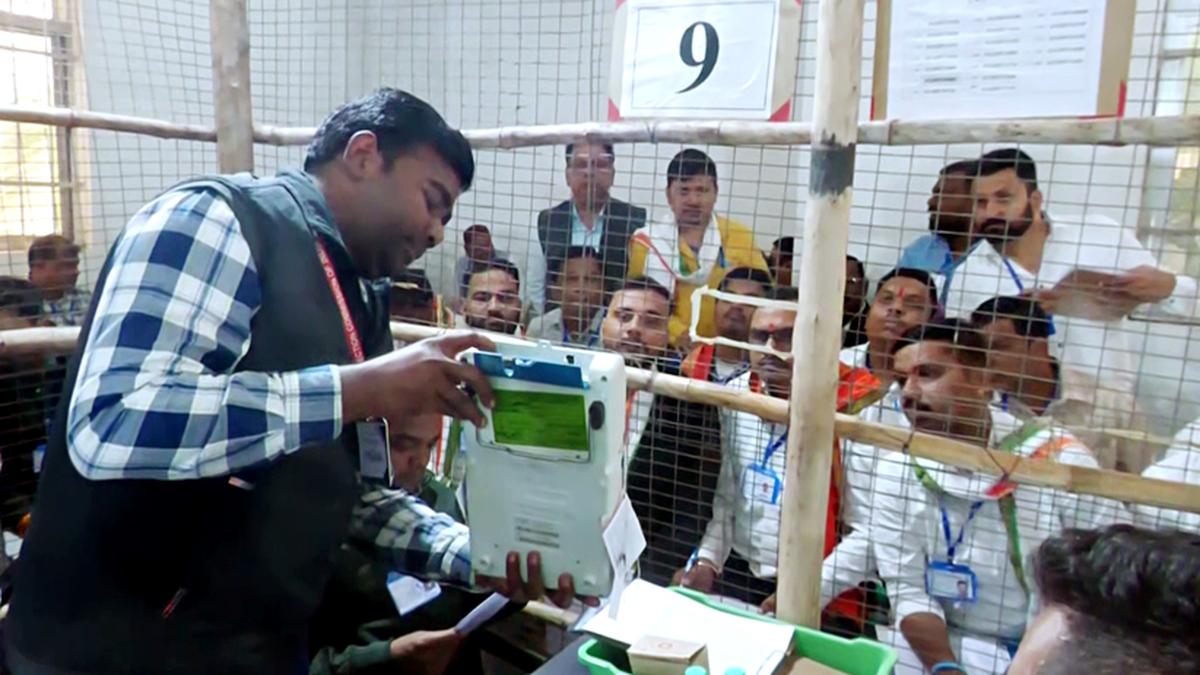
A official shows an EVM to party representatives at a counting centre for in Mumbai on November 23, 2024. | Photo Credit: ANI
For a reporter, it is always exciting and challenging to cover elections. There is plenty of ground to traverse, people to talk to, clues to pick up on, issues to report, and interviews to conduct. Reporting also involves observations and listening — for instance, to chatter in various places, such as tea stalls and village kattas (where people gather for conversions) — to gauge the mood. Before the recent Maharashtra Assembly elections, I heard diverse voices and issues across constituencies. Farmers spoke about crop losses, loan waivers, and Minimum Support Price. Young voters said they were frustrated about the job situation. Women spoke about inflation. In urban pockets, religious and caste polarisation, infrastructure issues, and the popularity of a few leaders dominated conversations. But to predict an outcome is a different game altogether. Yet, the inevitable question that journalists face from colleagues, family, friends, acquaintances, and even leaders during elections is “Who is going to win?”
At some point during this election, this became a common conversation starter as though reporters are privy to some secret knowledge about the numbers game. As voting day approached, the question was posed as a challenge — a friend even said, “If you are covering the polls, you should know the outcome, right?” I had some unhelpful stock replies: “Let’s wait and see” or “It is a tough fight”.
None of this is surprising, especially since TV journalists often wade into the tricky waters of election forecasting. When people pose this question, the (wrong) assumption is that journalists are not the chroniclers, but architects of history. But with experience, I have learned to refrain from getting too entangled in the arithmetic of polls or predicting outcomes; that unenviable job is best left to political pundits.
A seasoned journalist once told me, “In political journalism, the wind blows where it pleases. Our job is just to catch its scent.” While we managed to catch the scent — a broad spectrum of people, including women in rural areas, seemed to favour the Mahayuti alliance — predicting the scale of victory was trickier. It is safe to say that few imagined the scale of the Mahayuti’s victory. This was the case during the 2024 Andhra Pradesh Assembly elections too. Y.S. Jagan Mohan Reddy’s YSR Congress Party won merely 11 seats out of 175, leaving many journalists and analysts stunned and scrambling to explain the extent of his defeat.
The BJP got a historic mandate in Maharashtra with 132 seats, exactly 10 more than what the party had secured a decade ago. I heaved a sigh of relief for surviving another election cycle without sticking my neck out too far. But predictably, the question shifted and people began to ask, “Who is going to be the Chief Minister?” This is a relatively simpler question to tackle. In Maharashtra, the political grapevine had been buzzing for days and the name of one leader was floating about. But it is necessary to be cautious in this regard too, as politics always throws up surprises. In Rajasthan and Madhya Pradesh, for instance, leaders who were not in the race were suddenly sworn in as Chief Minister. Again, I did not commit to an answer.
This is not to say that there is no temptation to predict the outcome or reply with some confidence. But doing so or reporting certain events and statements too early can backfire, especially in a profession where credibility is currency. As my editor says, “It is not about breaking news; it is about breaking it right.”
As the dust settles on another election, I know that it is okay to not answer some questions. Reporters are not here to speculate or foresee the outcome. We are here to report stories that matter the most to the people, to provide a balanced view of the political climate, and to catch the scent as it were.
deshpande.abhinay@thehindu.co.in
Published – December 06, 2024 02:45 am IST


